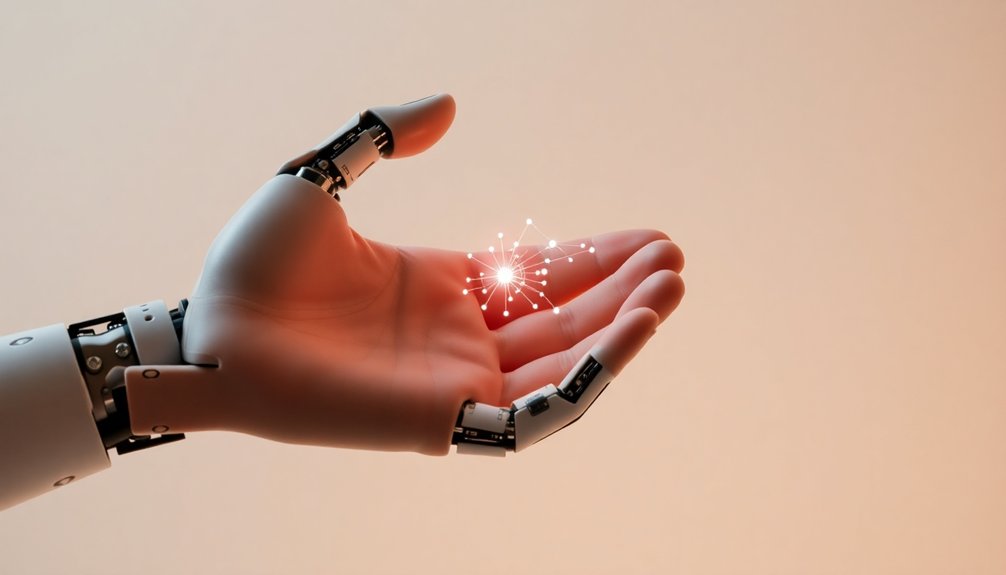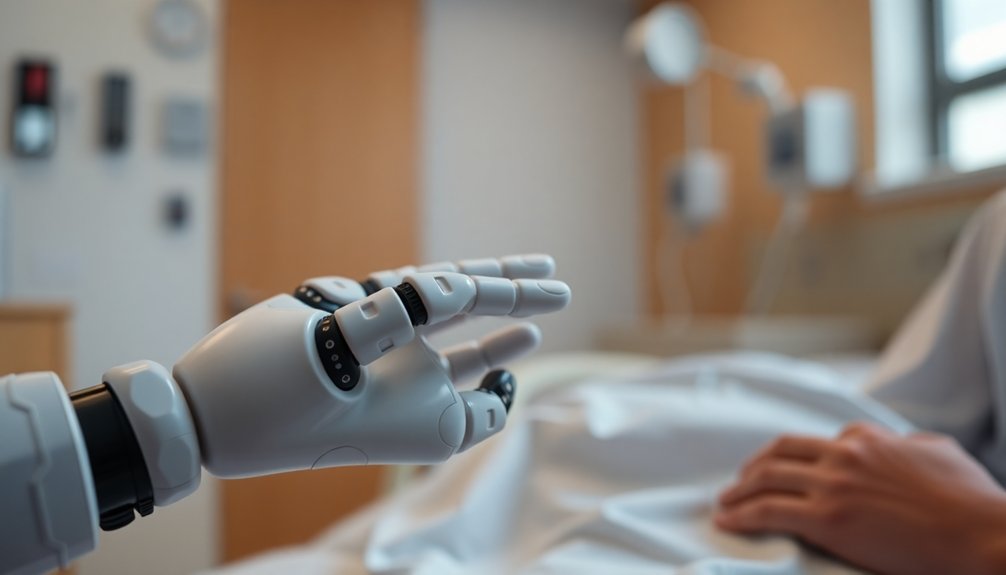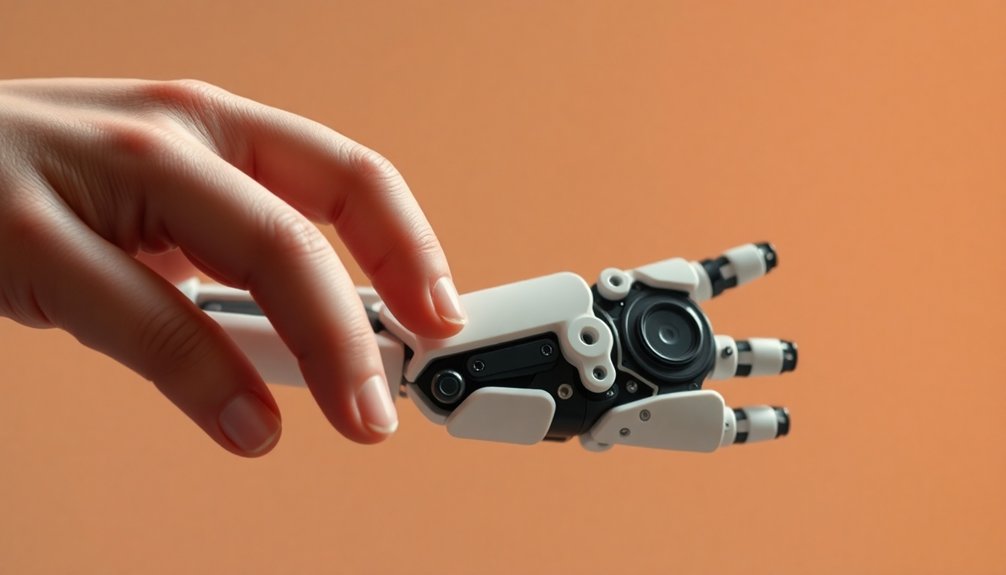Robots are getting seriously good at understanding your emotional vibe. They’re not just tracking facial twitches and text tone—they’re decoding complex feelings like psychological detectives. From AI companions helping lonely seniors to health assistants reading your stress levels, these machines are learning to “get” you. Want to know if your future robot buddy will genuinely understand your inner world? Stick around, and you might be surprised.
The Science of Algorithmic Empathy

If you’ve ever wondered whether robots can genuinely understand human emotions, welcome to the wild world of algorithmic empathy.
It’s like teaching a calculator to have feelings—sounds impossible, right? But these clever machines are getting sneaky good at reading us. Through natural language processing and sentiment analysis, AI tracks your mood faster than your best friend.
Machines decoding human emotions: turning cold algorithms into mood-reading wizards with eerie precision.
It decodes your text’s tone, watches your facial expressions, and predicts emotional states with scary accuracy. Multimodal emotional intelligence allows robots to parse complex human interactions by combining text, voice, and visual cues to build comprehensive emotional profiles.
Think of it as emotional forensics, where algorithms dissect human feelings like scientific specimens. The result? Robots that can almost—but not quite—understand what makes us tick.
Emotional Intelligence Beyond Binary Responses
Imagine robots that don’t just recognize emotions, but understand their messy, multilayered complexity. They’re learning to decode cultural whispers and contextual subtleties that once seemed impossible. Neuromorphic computing enables robots to develop more sophisticated emotional processing capabilities beyond traditional algorithmic approaches.
Think of it like teaching a brilliant but socially awkward friend how to read a room. These systems are moving beyond rigid algorithms, integrating psychology, ethics, and human complexity.
They’re not just mimicking—they’re attempting genuine comprehension. Will they nail sarcasm? Probably not yet. But they’re getting smarter about recognizing emotional depth beyond simple happy-sad binaries.
The goal isn’t creating robotic emotional twins, but building empathetic tools that respect human complexity.
Real-World Applications of Empathetic AI

Because technology’s moving faster than most people realize, empathetic AI isn’t just sci-fi anymore—it’s solving real-world problems right now.
These digital companions are changing how we handle everything from healthcare to loneliness:
- ElliQ robots keep seniors connected and cared for
- Lark Health’s AI coaches manage chronic conditions without human burnout
- Headspace’s Ebb helps process emotions between therapy sessions
- Replika provides non-judgmental support for isolated young adults
- Machine learning algorithms personalize education like a genius tutor
Think robots are cold? Think again.
They’re learning to understand human emotions better than some humans do. These aren’t just machines—they’re adaptive problem-solvers filling critical gaps in our overwhelmed social systems.
Robotic elder care is addressing critical emotional and practical needs for vulnerable populations, particularly those experiencing cognitive challenges like dementia.
And they’re just getting started.
Navigating Ethical Boundaries in Emotion Technology
As robots get better at mimicking human emotions, we’ve stumbled into murky ethical territory that feels more like a Black Mirror episode than a tech manual. You’re basically watching machines learn to fake feelings—and it’s getting uncomfortable. Neuromorphic computing is rapidly advancing the emotional mimicry capabilities of AI, pushing us further into this complex technological landscape.
| Ethical Concern | Potential Risk | Mitigation Strategy |
|---|---|---|
| Emotional Deception | User Manipulation | Transparent AI Design |
| False Attachment | Social Isolation | Clear Interaction Boundaries |
| Privacy Invasion | Data Exploitation | Robust Protection Protocols |
| Trust Erosion | Psychological Damage | Honest Capability Disclosure |
| Dependency | Reduced Human Interaction | Structured Interaction Limits |
The real question isn’t whether robots can feel, but whether they should pretend to. We’re walking a tightrope between technological marvel and emotional minefield—where every sympathetic robot response could be either a breakthrough or a betrayal. Welcome to the wild west of emotion tech, where the lines between genuine connection and sophisticated simulation blur faster than you can say “uncanny valley.”
Building Trust Between Humans and Emotional Machines

Trust between humans and emotional machines isn’t some sci-fi fantasy—it’s a delicate dance happening right now in labs, living rooms, and workplaces worldwide.
Understanding this connection isn’t just about technology; it’s about creating meaningful interactions that feel genuine and responsive.
Key elements driving human-robot trust include:
- Emotional intelligence that recognizes and adapts to human feelings
- Consistent, predictable performance across different scenarios
- Transparent communication about capabilities and limitations
- Empathetic response mechanisms that feel authentic
- Cultural sensitivity in interaction styles
Robots aren’t replacing human connections—they’re evolving to complement them. Cognitive engines are enabling robots to process knowledge in real-time, creating more intuitive and adaptive interactions between humans and machines.
People Also Ask About Robots
Can AI Truly Understand Emotions or Just Simulate Understanding?
You’ll find AI can simulate emotional understanding through pattern recognition, but it can’t genuinely experience emotions. It’s a sophisticated mimicry that analyzes data, not a true emotional comprehension.
How Do Robots Learn to Recognize Different Cultural Emotional Expressions?
You’ll learn to recognize cultural emotions by training AI with diverse datasets, using multimodal approaches that combine facial, vocal, and behavioral cues, and adapting algorithms to interpret nuanced expressions across different cultural contexts.
Will Empathetic AI Replace Human Therapists and Emotional Support Roles?
You’ll find AI won’t completely replace human therapists, but it’ll supplement emotional support by offering accessible, 24/7 initial assistance while maintaining ethical boundaries that preserve the depth of human therapeutic relationships.
What Personal Data Do AI Systems Collect During Emotional Interactions?
You’ll find AI systems collect facial landmarks, vocal tones, text sentiment, and physiological signals like heart rate to map your emotional state during interactions, tracking micro-expressions, acoustic patterns, and thermal changes in real-time.
Are There Potential Psychological Risks of Bonding With AI Companions?
You’ll risk emotional dependency, face potential psychological distress, and may withdraw from human connections as AI companions exploit your vulnerabilities, creating one-sided relationships that can ultimately harm your mental health and social interactions.
Why This Matters in Robotics
You’re standing at the edge of a robotic revolution where machines learn to feel. Your future isn’t about cold algorithms, but connections that blur human-machine boundaries. As emotional AI evolves, you’ll navigate a world where empathy isn’t just programmed—it’s experienced. Trust, understanding, and shared sentiment will transform how you interact with technology. Are you ready to embrace this emotional frontier where circuits meet consciousness?
References
- https://neurosciencenews.com/ai-llm-emotional-iq-29119/
- https://www.princetonreview.com/ai-education/emotional-intelligence-ai
- https://www.media.mit.edu/articles/new-study-highlights-opportunities-for-artificial-emotional-intelligence/
- https://hbr.org/2022/01/can-ai-teach-us-how-to-become-more-emotionally-intelligent
- https://www.bethel.edu/blog/ai-requires-emotional-intelligence/
- https://medicalxpress.com/news/2024-07-algorithms-role-human-empathy-ai.html
- https://www.psychologytoday.com/us/blog/the-digital-self/202502/the-empathy-algorithm-can-ai-outfeel-us-at-our-own-game
- https://blog.workday.com/en-us/empathy-what-it-means-for-an-ai-driven-organization.html
- https://www.frontiersin.org/journals/neurorobotics/articles/10.3389/fnbot.2023.1145989/full
- https://www.weforum.org/stories/2016/09/can-we-create-robots-with-human-emotions/
